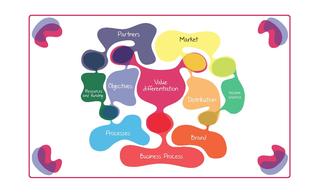Management science (MS) is the broad interdisciplinary study of problem solving and decision making in human organizations, with strong links to management, economics, business, engineering, management consulting, and other sciences. It uses various scientific research-based principles, strategies, and analytical methods including mathematical modeling, statistics and numerical algorithms to improve an organization's ability to enact rational and accurate management decisions by arriving at optimal or near optimal solutions to complex decision problems. Management science helps businesses to achieve goals using various scientific methods.
Information systems (IS) are formal, sociotechnical, organizational systems designed to collect, process, store, and distribute information. In a sociotechnical perspective, information systems are composed by four components: task, people, structure, and technology.
Engineering management is the application of the practice of management to the practice of engineering.
Business education is a branch of education that involves teaching the skills and operations of the business industry. This field of education occurs at multiple levels, including secondary and higher education institutes. Education in business has many forms, mainly occurring within a classroom of a school. Internships are also another way to receive this type of education. A business education has many components, as there are many different areas of the business industry as a whole. An education in business varies greatly in its curriculum and popularity around the world. Career development is often an integral part of an education in business.

Purbanchal University (PU), a public university in Biratnagar, was established in 1993 by the Government of Nepal with its fundamental objective of preserving, refining, inventing, adopting, extending and transmitting knowledge in an environment that fosters free enquiry and open scholarly debate, leading to all-encompassing development of the rural people and their economies and environment. Purbanchal University conducts its academic programs through its five constituent campuses as well as more than 123 affiliate colleges.The university covers 545 hectares of land in its Biratnagar premises.

The University of Kelaniya is a state university of Sri Lanka. Just outside the municipal limits of Colombo, in the city of Kelaniya, the university has two major campuses, seven locations, six faculties and four institutions.
The following outline is provided as an overview of and topical guide to management:

Business engineering (BE) is the development and implementation of business solutions, from business model to business processes and organizational structure to information systems and information technology (cf.).

The Virtual University of Pakistan, also known as VU, is a public university located in the urban area of Lahore, Punjab, Pakistan.

HEC Liège Management School - University of Liège is the college and graduate school of the University of Liège in the fields of economics, finance, business administration, entrepreneurship and engineering management.

The Syracuse University School of Information Studies, also known as the iSchool, is a center for research and education in the policy, systems, service, and technology aspects of information management, information science, and library science. Established in 1896 as the School of Library Science, its name was changed in 1974 to reflect the growing information field. Syracuse was the first library school to change its name in this way, hence its claim as "the original school for the information age." Starting in the 1970s, the school began to add new programs focused on information studies that aim to merge technology and management skills with an emphasis on human needs and behavior.
A Master of Science in Information Technology is a type of postgraduate academic master's degree usually offered in a University's College of Business and in the recent years in integrated Information Science & Technology colleges. The MSIT degree is designed for those managing information technology, especially the information systems development process. The MSIT degree is functionally equivalent to a Master of Information Systems Management, which is one of several specialized master's degree programs recognized by the Association to Advance Collegiate Schools of Business (AACSB).
The Master of Science in Information Systems (MSIS), the Master of Science in Management Information Systems (MSMIS), and Masters in Management Information Systems are specialized master's degree programs usually offered in a university's College of Business and in integrated Information Science & Technology colleges in recent years. The MSIS degree is designed for those managing design and development information technology, especially the information systems development process. The MSIS degree is often thought to be functionally equivalent to a Master of Information Systems/Technology Management, however the two are distinguishable in that the latter has much more equitable composition of information science/systems, and business/management. Nonetheless, for the purposes of this broad overview, MSIS is included with MSMIS and MMIS which are specialized master's degree programs recognized by the Association to Advance Collegiate Schools of Business (AACSB) and the Accreditation Council for Business Schools and Programs (ACBSP).
A Business and Computing is a dual degree program offered jointly by some computing and business schools. The program generally lasts four-five years instead of seven-eight years to complete separate the two degrees and results in the candidate earning both a Bachelor of Business degree and a Bachelor of Computing degree. Graduating Business and Computing students may choose to work on computing/technical matter, or enter the business world, or even enjoy the gray area between business and computing fields such as IT security officer, IT consultant, etc. Even though a majority of Business and Computing graduate from a single university, there are people who earn these degrees from different universities.
The Khoury College of Computer Sciences is one of the nine colleges of Northeastern University in Boston, Massachusetts. It specializes in computer science, data science and cybersecurity. Prior to December 16, 2018, Khoury College was known as the College of Computer and Information Science.
The Shaheed Zulfikar Ali Bhutto Institute of Science and Technology (SZABIST) is a private institute with multiple campuses in the residential and commercial areas of Pakistan and United Arab Emirates. Its main campus is located in Karachi, Sindh, Pakistan.
The Indiana University School of Informatics, Computing, and Engineering (SICE) is an academic unit of Indiana University located on the Indiana University Bloomington (IUB) campus and, under the name Indiana University School of Informatics and Computing (SOIC), on the Indiana University – Purdue University Indianapolis (IUPUI) campus. On the Bloomington campus, the School consists of the Department of Informatics, the Department of Computer Science, the Department of Information and Library Science, and the Department of Intelligent Systems Engineering. On the Indianapolis campus, the School consist of the Department of Human-Centered Computing, the Department of BioHealth Informatics, and the Department of Library and Information Science.

The University of Kotli is a university in the Pakistani state of Azad Jammu and Kashmir. The University of Kotli (UoK) was formerly a constituent college of the University of Azad Jammu and Kashmir. It was formerly known as the University College of Administrative Sciences Kotli (UCK) and as the Faculty of Administrative Sciences Kotli (FASK). UoK is state university and the President of Azad Jammu & Kashmir State serves as the Chancellor of the University. The Vice-Chancellor is the chief executive and manages the university.
Bina Nusantara University also known as BINUS University is a private university located in Jakarta, South Tangerang and Bekasi, Indonesia. All of its campuses are located within the area of Greater Jakarta Region.









